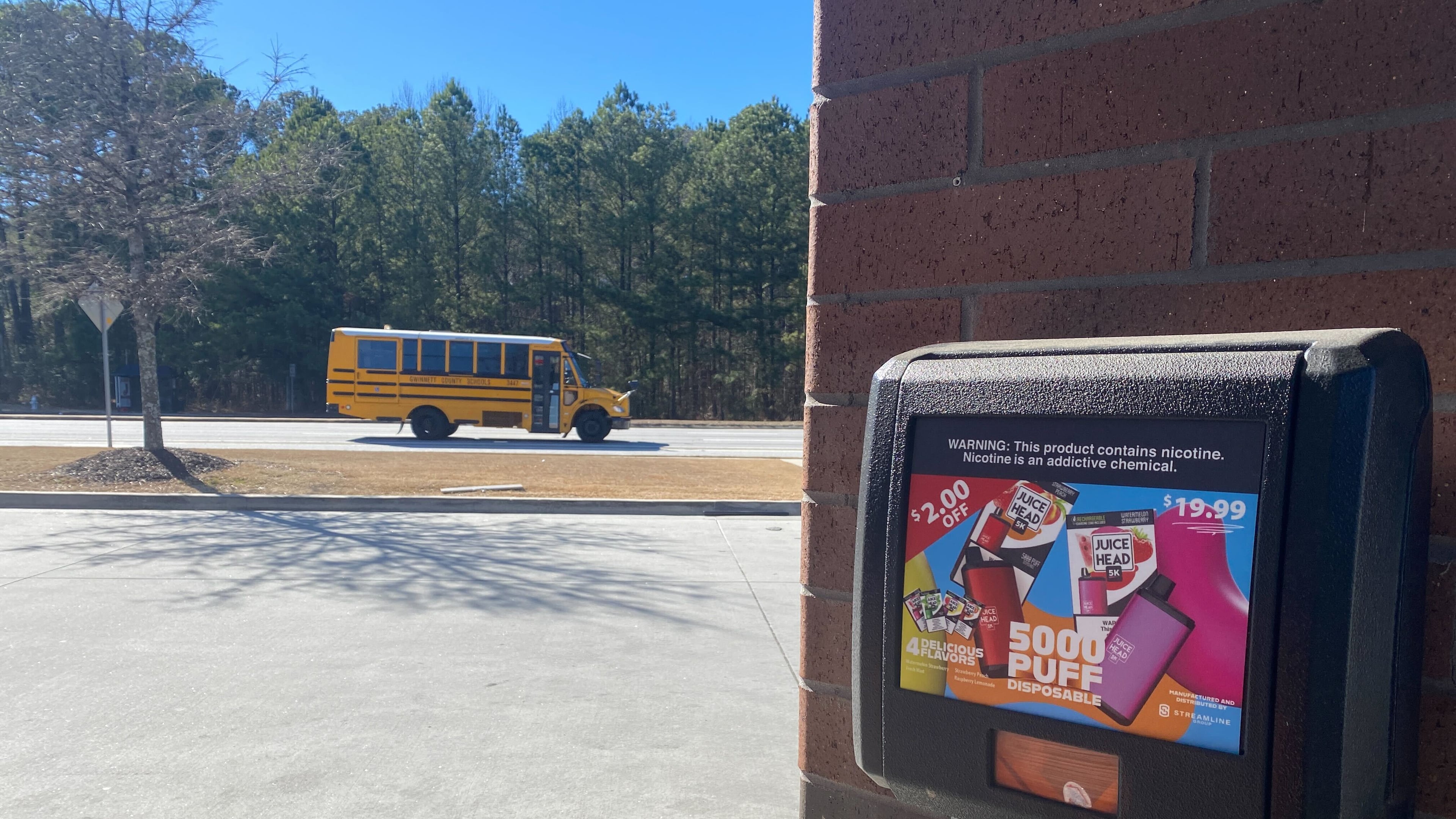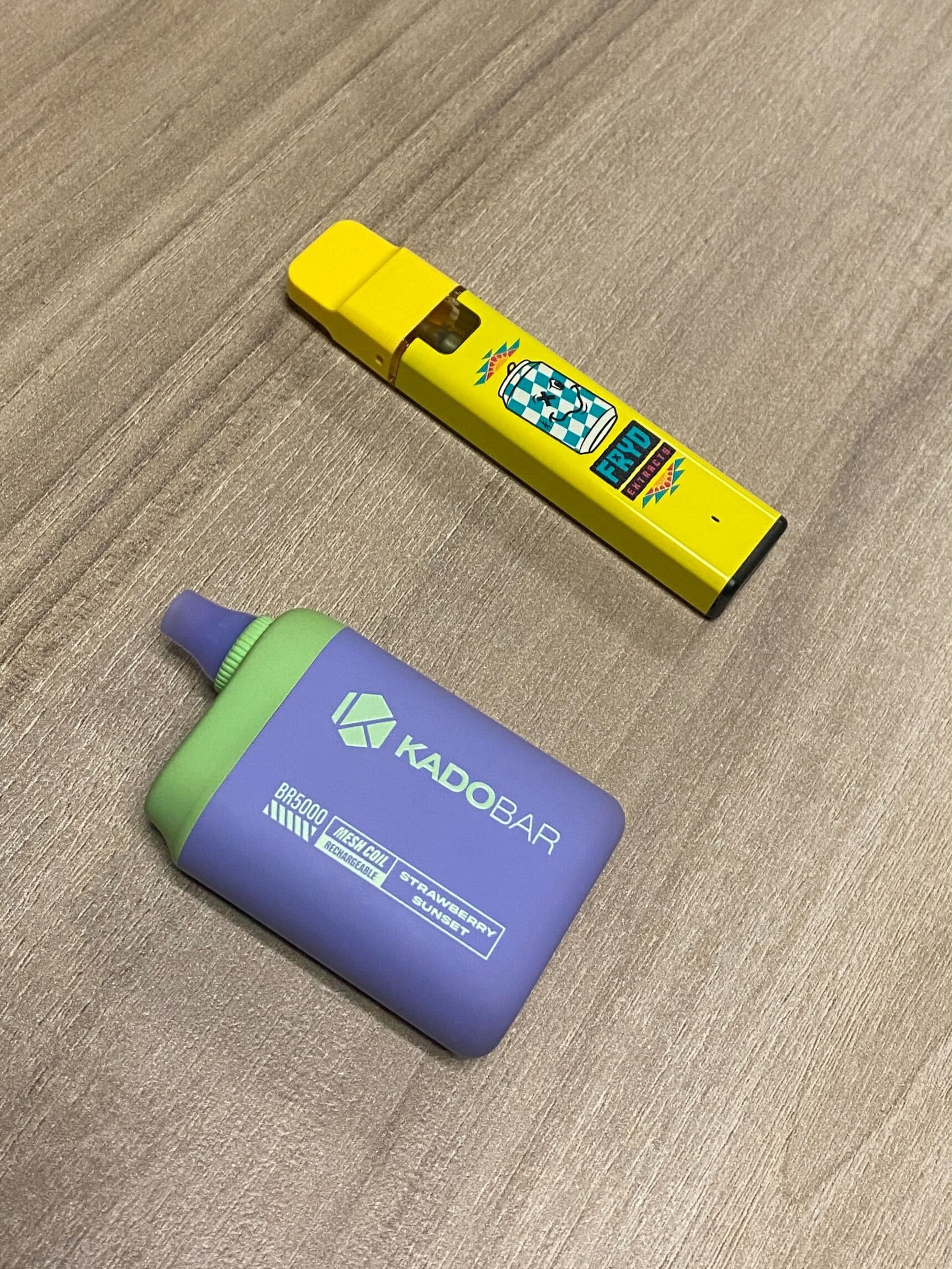As Georgia schools struggle to snuff out student vaping, here’s what experts say

Editor’s note: This article was updated to state Richard Marianos is a retired Assistant Director of the Bureau of Alcohol, Tobacco, Firearms and Explosives.
The signs at the gas pumps wouldn’t warrant a second glance to many: just another e-cigarette advertisement, this one boasting a discount, several different “delicious” fruit flavors and a few thousand puffs.
There’s a disclaimer about the addictive properties of nicotine, but no notice that the device is not authorized by any government agency or that disposable devices like this one are the go-to option among the estimated 1 million U.S. middle and high school students hooked on vaping.
Many Georgia schools are within a mile or two of gas stations and vape shops with ads like these, and they’re continuing to grapple with ways to keep students from vaping, particularly on campus. In Georgia’s public schools, e-cigarettes and vaping have become the most common substance abuse issue, surpassing alcohol, tobacco and other drugs.
Across the state, there were 22,209 incidents of students disciplined for vaping during the 2022-2023 school year, according to the Governor’s Office of Student Achievement. The prior school year, there were 18,724 incidents. Georgia has about 1.7 million public school students across all grade levels.
Beyond nicotine addictions, some have seen immediate medical issues.
A teen in Dalton fell into a coma last April after using a vape laced with fentanyl — his mom said bullies made her son do it. At Berkmar High School in Gwinnett County, staff had to rescue a student last semester after she overdosed from using a vape laced with fentanyl. And several years ago, a Gwinnett County mom shared the story of her son’s lungs collapsing after heavy e-cigarette use, urging other parents to be vigilant.

“If it’s happening in the community, it’s going to eventually happen in school,” Berkmar Principal Durrant Williams said, referring to vapes and drugs. “So what measures do we need to put in place to remedy what goes on in the community and make sure it doesn’t have a huge impact here?”
The problem, school leaders and others say, is U.S. stores and online marketplaces are being inundated with illegal flavored vaping products that are more enticing to students and federal regulators are having trouble keeping up.
Schools search for answers
Georgia enacted a law in 2021 requiring education in public schools about the risks associated with vaping, and many school districts have created rules violations specifically about vaping.
Fulton County Schools Superintendent Mike Looney said in a January meeting that the district needed to update its policy to clarify that confiscated vapes will be destroyed.
The district said in a statement that schools need help: “Student access to (vapes) is still a reality and thus will take a continued partnership between community, parents, law enforcement and schools to educate our students, enforce Georgia law and (ensure) compliance with our Student Code of Conduct in order to reduce student access even further.”

Several large districts in metro Atlanta set the initial consequence for vaping at a suspension — repeated offenses can net a student up to 10 days out of school. Vaping violations are now the most common substance abuse infractions in Gwinnett, the largest district in Georgia with about 190,000 students. Last school year, 1,565 students violated the district’s vaping rules — up from 1,218 the year prior. Officials in Fulton, Georgia’s fourth-largest school district, said they did not have vaping violation statistics immediately available.
Retired Bureau of Alcohol, Tobacco, Firearms and Explosives Assistant Director Richard Marianos told a panel of metro Atlanta elected officials, parents and school administrators late last year that parents and school staff should be vigilant of youth vaping, particularly because manufacturers disguise products as common items that students use for school or even build vapes into bags or clothing.
Shunda Walker, an assistant principal at Henry County’s Luella Middle School, also spoke on the panel and said, “The businesses are becoming more creative about the products that they’re putting out. We see the pens, the USBs. We’ve even seen the hoodies and most recently we’ve heard about the backpacks.”
Schools in other states have installed sensors, often without informing students, to find e-cigarettes. The Tyler Independent School District in Texas announced a crackdown on vaping in 2022 that included vape detectors at its high schools and middle schools. Students with a vaping device that contains any other substance in it, such as THC oil, will be arrested on felony charges, the policy states.
High demand, weak regulations
Marianos stressed that while discipline and intervention are important, the solution isn’t in punishing kids. The focus needs to be on manufacturers, importers and sellers skirting the law and on pressing authorities to enforce rules that prevent illegal products from entering the U.S., he and other experts say.
Businesses in Georgia have written to the U.S. Food and Drug Administration, asking for government help.
Ben Cowart, vice president of government affairs for Georgia Retailers, said law-abiding retailers are often uncertain about what products are legal and also frustrated by competitors who flout the law. “These products are targeting our youth with kid-friendly flavors and youth-enticing packaging causing irreparable harm to communities and families throughout our state,” Cowart said in the organization’s letter to the FDA.
The group asked federal authorities for clear information on which disposable vaping devices are legal to sell and for stronger enforcement of illegal imports. The FDA responded with its list of e-cigarette products that are authorized for sale — there are only 23, and none of them are fruit-flavored. The administration has issued hundreds of warning letters to manufacturers and sellers of illegal vapes.
The U.S. surgeon general labeled youth vaping an epidemic in 2018, and Juul was the first brand in the spotlight. Federal authorities accused the company of using fruity flavors and colorful advertisements to appeal to kids rather than adults looking to quit smoking. The government banned fruit-flavored e-cigarettes and came down hard on Juul.
But the demand for convenient, flavored products remained high, and regulation remained weak.
That led new manufacturers, many seemingly unconcerned with U.S. government rules, to develop brightly colored vaping devices with flavors like Blue Razz Ice and Miami Mint. Elf Bar is the most common device used by teens, and the manufacturer has attracted intense scrutiny by U.S. authorities. Elf Bars, which are also branded EB because of regulations, and other common devices among young users are designed to be used a few thousand puffs and can cost as little as $15.
Despite most of these products not being authorized for sale, it’s not hard to find an online retailer, small vape shop or even chain convenience store selling them.
The devices pose a safety risk, said Stephen Bjes, a former police officer in the Midwest who’s now an advocate for better enforcement related to e-cigarettes. “The danger is these items are coming from China. They’re made with chemicals that we don’t know what’s in them, and there’s no regulation. We have no clue what’s coming into our country.”
Bjes said communities should not expect the federal government to solve the issue of youth vaping because the problem has grown so large. He said authorities ought to shut down importers, but the reality is that sellers have found ways around the law.
Local law enforcement, code enforcement officers, local ordinances and state laws need to be leveraged to have an impact because, Bjes said, “relying on the FDA to take a more active role has not been effective.”
Youth vaping in America
The U.S. Food and Drug Administration’s Youth Tobacco Survey estimated 2.1 million middle and high school students used e-cigarettes in 2023. About half of those students considered themselves “current users,” and almost 90% of them reported using fruit-flavored e-cigarettes. The survey found a decline in overall tobacco usage among youths, but stated the figures are still concerning: “Given the number of middle and high school students that use tobacco products, sustained efforts to prevent initiation of tobacco product use among young persons and strategies to help young tobacco users quit are critical to reducing U.S. youth tobacco product use.”



